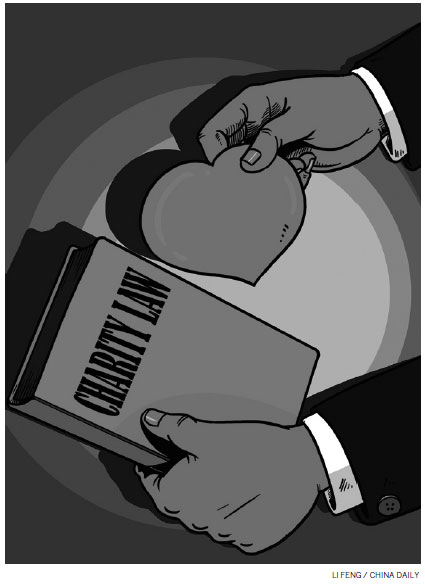Charity law takes root in right earnest
The newly passed Charity Law balances the interests of charity organizations, donors, volunteers, beneficiaries and trustees, and is expected to protect legal rights of those taking part in charity work and promote social development.
First, by granting more charity organizations the right to collect donations from the public, it breaks the monopoly of a few organizations and promotes the cause of charity. Article 22 of the Charity Law says charities registered for more than two years can apply to get permission to directly collect donations from the public, but bars unauthorized organizations or individuals from doing so. To collect donations from the public during emergencies, unqualified organizations and individuals have to cooperate with the authorized charities, or else they will be punished according to the law.
Another highlight of the law is that it forbids the use of administrative power to demand compulsory donation, which is aimed at eliminating administrative intervention in charity work.
Second, the law emphasizes the protection of the dignity and privacy of beneficiaries and participants, highlighting the principles of equality, fairness and justice, and the fact that "all people are equal before charity". The law says the dignity and privacy of beneficiaries and volunteers should be respected and protected. It also forbids making public the personal information of donors and beneficiaries without permission, and asserts violators will be punished according to the law.
Third, the Charity Law protects the rights and interests of service donors, in order to promote public participation in voluntary service. Since the total amount of social donations in China adds up to more than 100 billion yuan, the number of volunteers is expected to rise sharply. The Charity Law says charities should assign work and responsibilities to volunteers according to their age, education level, skill and physical health, and buy them accident insurance, if necessary. Charity organizations also have to issue service certificates to volunteers for the work they have done if required.
Fourth, charity trusts will attract social assets to promote the cause of charity. Chapter 5 of the Charity Law says charity trusts can help open technological paths for the preservation and appreciation of the money and assets donated. According to China's Trust Law, the assets and earnings of charity trusts can only be used for charity.
Other improvements in the law include granting donors the right to supervision, accountability for fraud, and confiscation of donations that have been misused.
There are no real differences between China's Charity Law and the British Charity Law issued in 1601 and revised several times. Charity organizations and activities in Western countries are much more developed because they began several centuries ago. In contrast, legislation on charity in China has just started.
The law emphasizes the importance of regulating charity work and according priority to legislation on aspects such as donations and other types of aid with the aim of promoting charity.
With the continuous development in charity work and improvement of the legal system, the authorities are likely to further revise some other facets such as the status of a legal person, business positioning of charities and the nature of their right to property.
The Charity Law is the government's suitable and positive response to the demands of social development, as it promotes not only social work to help the poor and people in need, but also altruism and morality.
The author is a researcher at the National Institute of Social Development, Chinese Academy of Social Sciences.



















